- Expert advice/
- Fashion & beauty/
- Wedding attire/
- Average Cost of Bridesmaid Dresses: What to Expect
- Wedding attire
Average Cost of Bridesmaid Dresses: What to Expect
Average cost of bridesmaid dress: $100 to $300 per dress. Learn what affects pricing—from fabric and designer to alterations—and how to save.
Last updated November 4, 2025
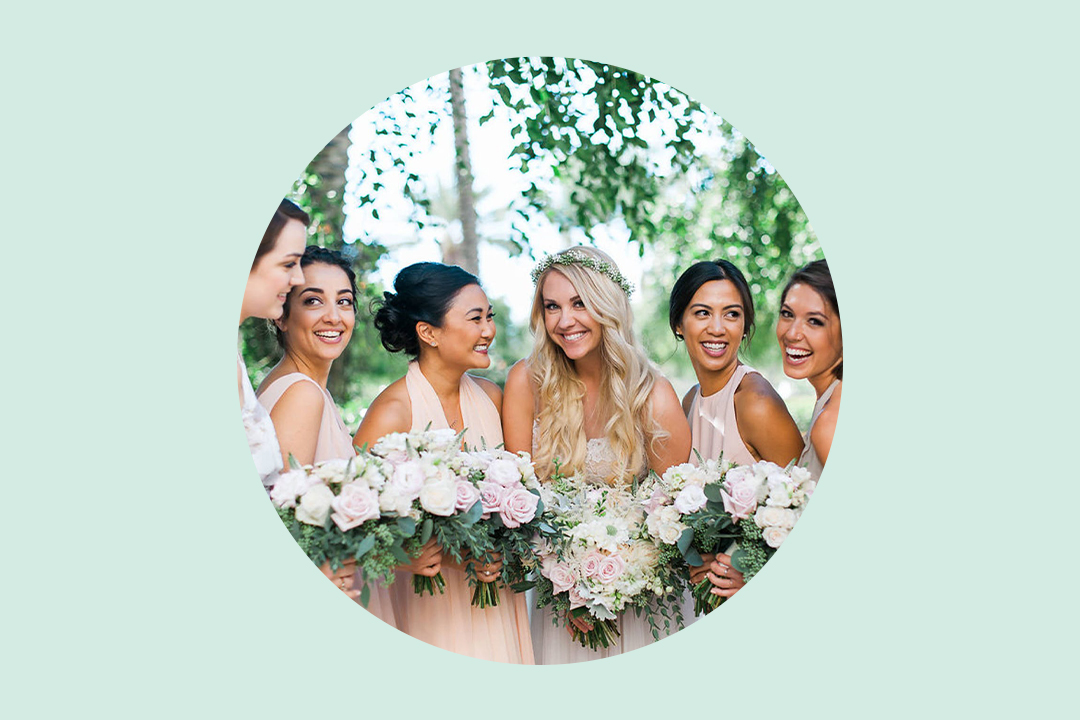
- Budget basics: Most bridesmaid dresses cost between $100-$300 (averaging $130-$150), but the dress is just the starting point—you'll also need to budget for alterations ($30-$100), shoes, accessories, and potentially professional hair and makeup services.
- Who pays varies: While bridesmaids traditionally buy their own dresses, modern couples increasingly contribute to or fully cover these costs, so have an upfront conversation about budget expectations before dress shopping begins.
- Smart savings strategies: Shop sample sales, consider rentals for expensive designer options, embrace mismatched styles within the same color family, and look for versatile designs you can rewear to other events.
- Location and timing matter: Urban areas typically cost more than smaller cities, and ordering during off-peak seasons or end-of-year sales can save money.
Being a bridesmaid comes with excitement, honor, and expenses that go well beyond just showing up on the big day. Your bridesmaid dress represents just one piece of a larger financial puzzle that includes alterations, accessories, travel, and potentially professional beauty services.
Understanding these costs upfront helps you budget effectively and have honest conversations with the couple about what works for your finances. We'll break down everything from dress price ranges and regional differences to smart saving strategies that let you celebrate your friend without breaking your budget.
How Much Do Bridesmaid Dresses Cost?
Most bridesmaid dresses cost between $100 and $300, with the typical price landing around $130 to $150. This represents just the dress itself, not the full cost of you day-of look.
The dress price is your starting point. You'll also need to budget for alterations, shoes, accessories, and possibly professional hair and makeup services depending on what the couple decides.
What Affects Bridesmaid Dress Prices?
Several key factors determine whether you'll pay closer to $80 or $400 for your bridesmaid dress. Understanding these helps you set realistic expectations and plan your budget.
Wedding formality level creates the biggest price swing. Black-tie events typically require more expensive fabrics like silk or satin, plus formal construction details. Casual beach weddings or backyard celebrations let you choose simpler styles in lightweight fabrics that cost much less.
Designer and retailer choice offers the widest price range:
- Budget options: David's Bridal, online retailers ($60-$120)
- Mid-range brands: Azazie, Birdy Grey, Kennedy Blue ($90-$180)
- Designer labels: Jenny Yoo, Dessy, Wtoo ($200-$400+)
Fabric selection directly impacts your final cost. Chiffon and polyester blends represent the most affordable choices. Silk, satin, and velvet command higher prices due to material costs and more complex construction. Specialty details like lace overlays, beading, or embroidery add significantly to the base price.
Timing and customization can push costs higher. Rush orders during peak wedding season often include $50 to $100 surcharges. Custom sizing, non-standard colors, or special length requirements typically add fees to the standard pricing.
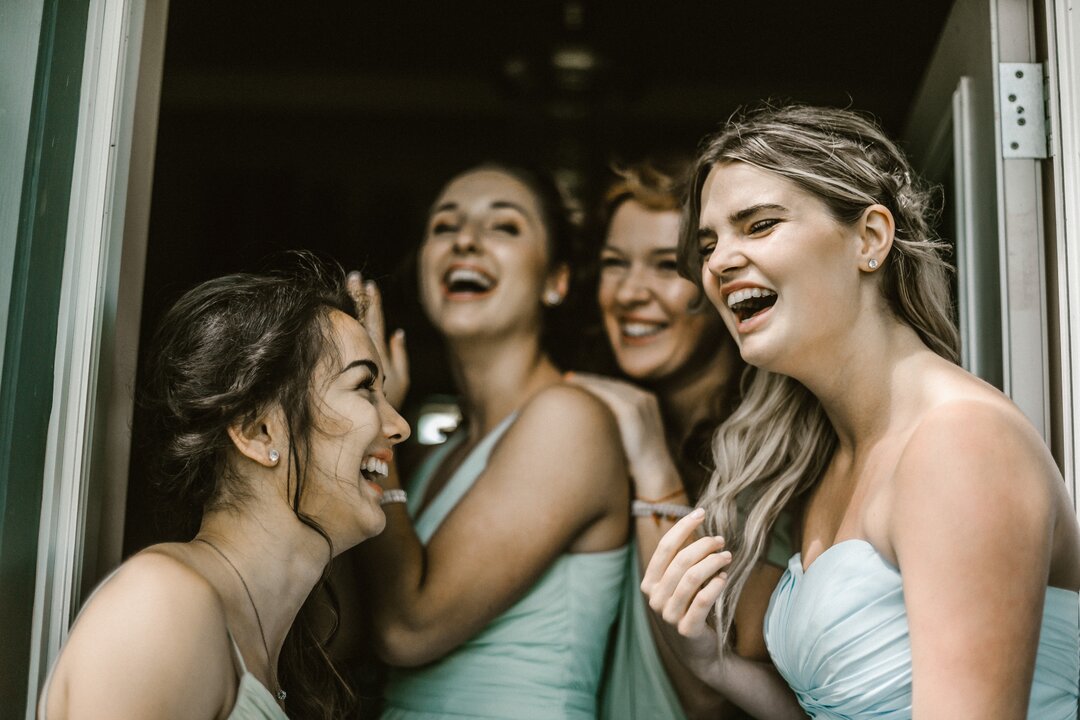
Who Pays for Bridesmaid Dresses?
Traditionally, bridesmaids buy their own dresses, and this remains the most common arrangement. However, some couples increasingly contribute to or fully cover these costs as a thank-you gesture to their wedding party.
Clear communication prevents awkward situations and financial stress. Couples should discuss who pays for bridesmaid dresses and budget expectations with their bridesmaids before selecting specific dresses. This conversation allows everyone to find solutions that work financially.
When cost becomes an issue, creative alternatives exist. Some couples split the difference between what bridesmaids can afford and their preferred dress price. Others choose a color palette and let each person select a dress within their individual budget, creating a beautiful mismatched look.
Many couples recognize that asking friends to be in their wedding involves significant expenses beyond just the dress. This awareness has led to more open conversations about costs and solutions that prioritize relationships over rigid traditions.
Beyond the Dress: Other Bridesmaid Expenses
The dress represents just one piece of the total investment required for wedding party participation. Understanding what do bridesmaids pay for? helps both bridesmaids and couples plan more effectively.
Alteration costs
Most bridesmaid dresses require alterations to achieve the perfect fit. Basic alterations typically cost between $30 and $100, depending on complexity and local pricing.
Common alterations include:
- Hemming to adjust the dress length is the most frequent need ($20-$40)
- Taking in or letting out: Bodice adjustments require skilled work ($40-$80)
- Complex changes: Multiple fittings or structural modifications ($80-$150)
Book alterations early, especially during peak wedding season when seamstresses have full schedules. Early booking often results in better pricing and ensures your dress is ready well before the wedding date.
Hair and makeup services
According to the Zola Wedding Cost Index (ZWCI), professional wedding hair and makeup services average $982 nationally. While this figure represents total bridal services, bridesmaids often share in these expenses when couples opt for professional services for the entire wedding party.
The arrangement for who pays varies widely:
- Couple covers costs: Treated as part of the wedding budget
- Bridesmaids pay individually: Each person handles their own services
- Split arrangement: Couple pays for bride, and either hair or makeup for bridesmaids
Group bookings often provide discounts compared to individual appointments. Many artists offer package deals when servicing multiple wedding party members at the same location, some even requiring a person minimum.
Shoes and accessories
Beyond the dress itself, the final look often requires several other components that contribute to the bridesmaid's total cost, typically ranging from $50 to $150.
-
Footwear: The wedding style dictates the shoe, from casual sandals for a beach ceremony to formal heels for a ballroom. Comfort is key for a long day of standing and dancing.
-
Accessories: This includes jewelry, hair accessories, and a clutch. To save on costs, many bridesmaids coordinate with the wedding party to wear pieces they already own.
-
Undergarments: This is an often-overlooked expense. The style of the dress (e.g., strapless, backless, or a specific fabric) may require purchasing a new, specific bra, shapewear, or slips.
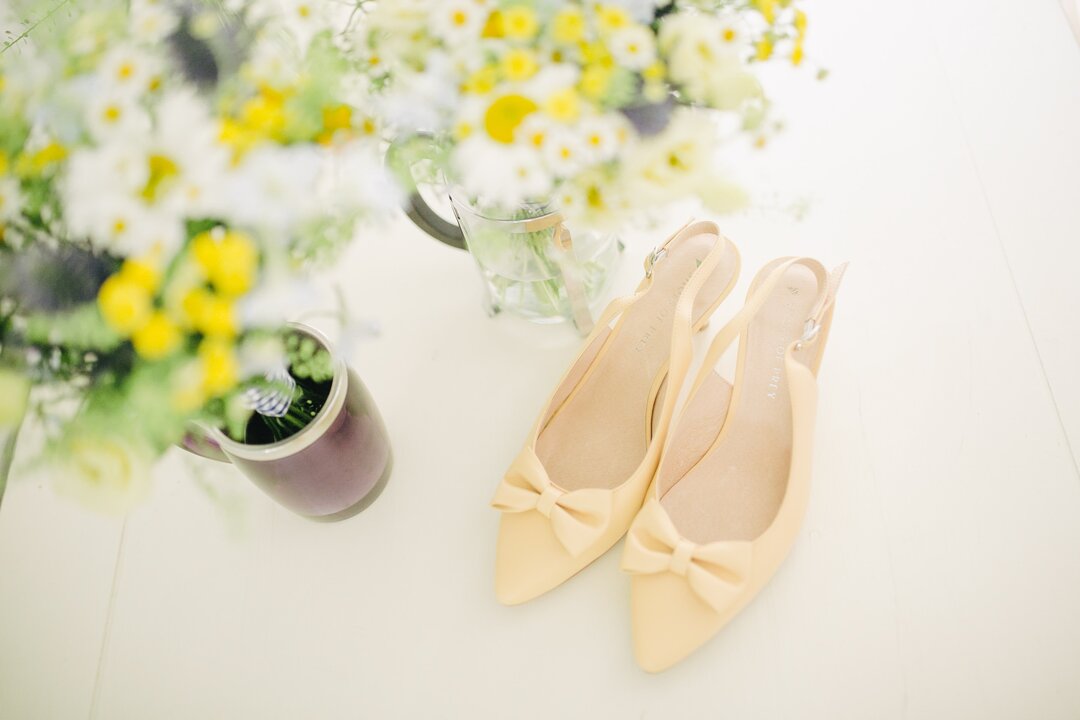 Photo Credit // Unsplash
Photo Credit // Unsplash
Smart Ways to Save on Bridesmaid Dresses
Reducing dress costs doesn't mean sacrificing style or quality. Strategic shopping approaches help you find beautiful options while staying within budget.
Shop sample sales and off-season clearances for designer dresses at reduced prices. Bridal boutiques clear inventory during slower periods, offering discounts of 30% to 70% on current styles. Sign up for retailer newsletters to receive advance notice of sales events.
Consider rental services for expensive designer options you'll wear once. Rental platforms offer bridesmaid dresses for a fraction of purchase prices, including delivery and professional cleaning. This works especially well for formal weddings where dress costs typically run higher.
Embrace mismatched styles within the same color family to accommodate different budgets and body types. This popular trend allows each bridesmaid to choose options within their comfort zone while maintaining visual cohesion. Some may select designer pieces while others choose budget-friendly alternatives in the same shade.
Choose versatile designs you can wear again for other occasions:
- Classic A-line styles: Work for multiple event types
- Neutral colors: Navy, burgundy, forest green transition well to other events
- Simple silhouettes: Avoid overly wedding-specific details like excessive ruffles
Search secondhand marketplaces for gently used dresses in excellent condition. Online platforms and local consignment shops often feature dresses worn only once. This option works well if you're flexible about having the newest styles.
Negotiate group discounts when ordering multiple dresses from the same retailer. Many stores offer price breaks for orders of five or more pieces. Online retailers frequently provide promotional codes for bulk purchases. Designate one person to coordinate the group order and handle retailer communications.
Regional Price Differences to Consider
Location significantly impacts bridesmaid dress costs, just like other wedding expenses. Urban areas typically command higher prices than smaller cities or rural locations.
Major metropolitan areas often feature more designer boutiques and upscale retailers, which can drive average prices higher. However, these same cities usually offer more shopping options, including discount retailers and sample sale opportunities.
Consider shopping online if local options exceed your budget. Many online retailers offer free shipping and returns, allowing you to try dresses at home without geographic limitations. Factor in time for potential exchanges when ordering online.
Some couples choose to have all bridesmaids order from the same online retailer to ensure color matching, even if they live in different cities. This approach standardizes pricing and eliminates variations between different store locations.
Timing Your Purchase for Best Prices
When you shop can significantly impact what you pay for your bridesmaid dress. Strategic timing helps you secure better deals while ensuring plenty of time for alterations.
Avoid peak season surcharges by ordering during slower periods. Many retailers charge rush fees during April through October when most weddings take place. Ordering during winter months often results in standard pricing and better customer service.
Plan for alteration timelines when timing your purchase. Most dresses require 2-4 weeks for alterations, plus additional time for any necessary adjustments. Factor this into your ordering schedule to avoid rush charges.
Watch for annual sales events like Black Friday, end-of-season clearances, and New Year promotions. Many bridesmaid dress retailers offer significant discounts during these periods, though selection may be more limited.
Consider trunk shows at local bridal boutiques for designer options at reduced prices. These events typically offer 10-20% discounts on featured designers, plus the opportunity to see dresses in person before ordering.
Managing Multiple Wedding Expenses
If you're in multiple weddings within a short timeframe, costs can add up quickly. Strategic planning helps you manage expenses across several events.
Look for dresses you can rewear across different weddings if the couples choose complementary colors or styles. Navy, burgundy, and forest green work well for multiple occasions and seasons.
Coordinate with other bridesmaids who might be in similar situations. Sometimes you can share accessories, shoes, or even dresses across different weddings.
Budget annually for wedding party expenses if you anticipate multiple invitations. Setting aside money throughout the year makes individual wedding costs more manageable when they arise.
Bridesmaid Dress Cost FAQs
Is $200 too much for a bridesmaid dress?
$200 falls within the normal range for bridesmaid dresses, but the right amount depends on your financial situation and the wedding's overall expectations. Honest communication with the bride about your comfort level helps avoid financial stress.
Who typically pays for bridesmaid dresses?
Bridesmaids traditionally purchase their own dresses, though modern couples often contribute to costs or cover them completely as appreciation for their wedding party. The arrangement should be clearly communicated before dress selection begins.
Can I wear my bridesmaid dress to other events?
Many current bridesmaid dresses are designed for rewear, especially those in classic colors and simple silhouettes. Choose styles that match your personal taste and lifestyle for the best chance of wearing the dress again.
What should I do if I cannot afford the chosen dress?
Have an honest conversation with the bride immediately about your budget limitations. Most couples want their wedding party to feel financially comfortable and will work together to find alternatives that work for everyone.
Do all bridesmaids need to wear identical dresses?
This depends entirely on the bride's vision for her wedding party appearance. Many modern celebrations embrace mismatched looks that allow flexibility in both style and price while maintaining harmony through coordinated colors.
Up next for you
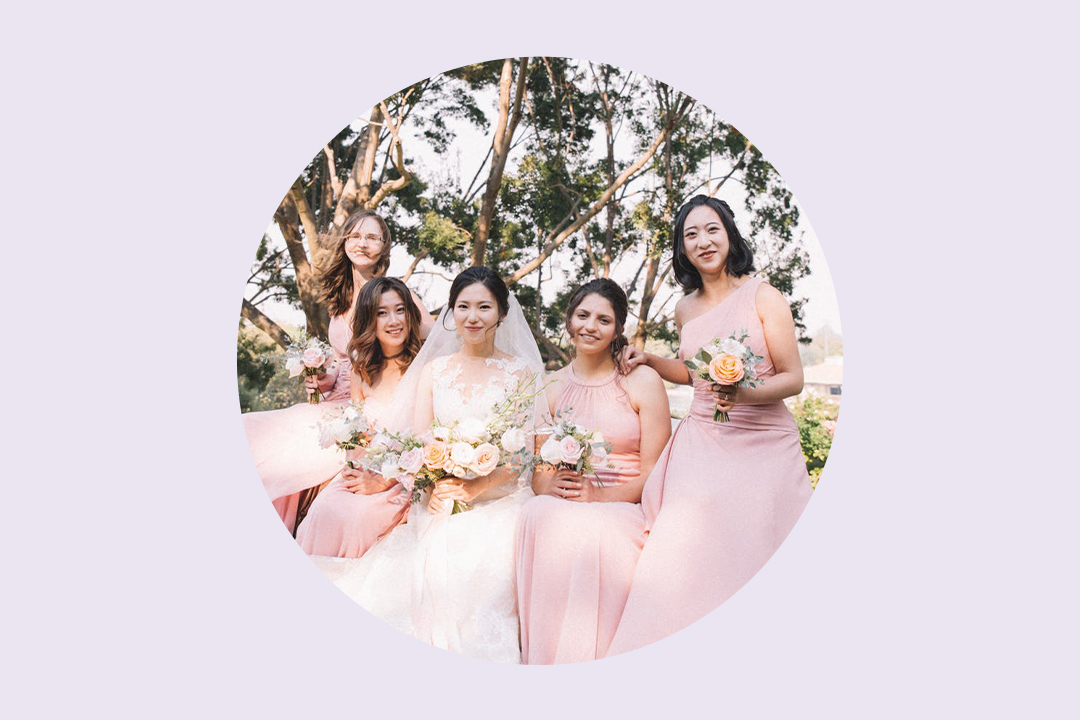
Where to Buy Bridesmaid Dresses: 13 Shops + Answering FAQs
List
Read our round-up of the best places to buy bridesmaid dresses online, plus storefronts to try them on in person. Some budget-friendly, some unique, all flattering.
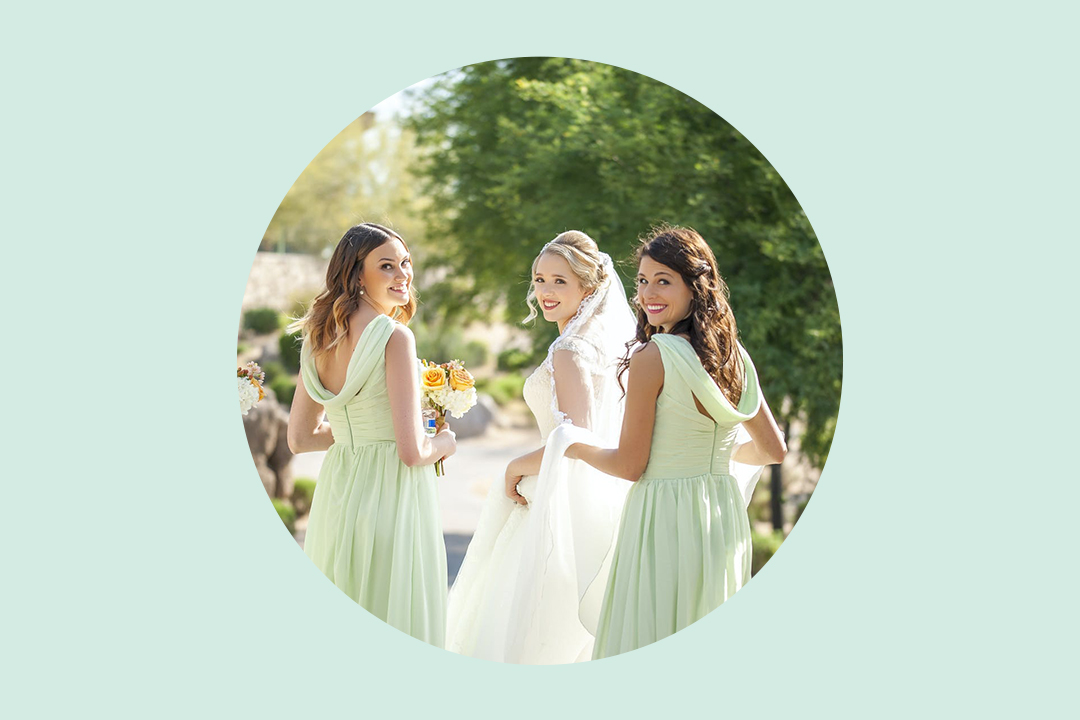
Who Pays for Bridesmaid’s Dresses?
Advice
Not quite sure who should be paying for the bridesmaid's dresses at your wedding? Read our guide to our expert advice.
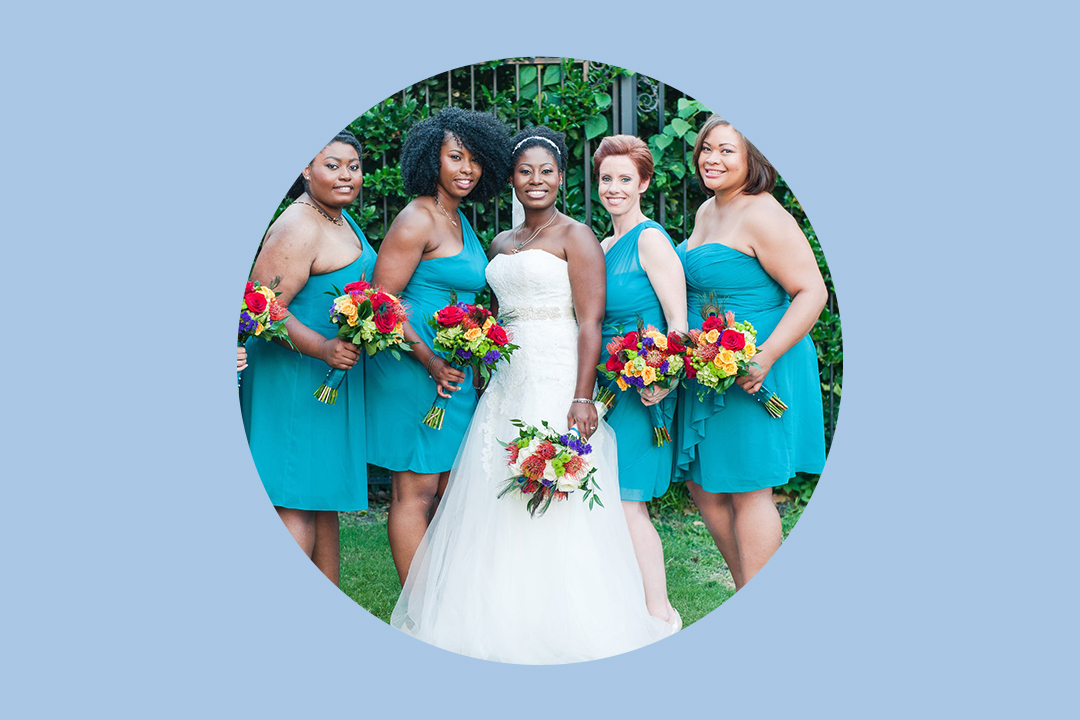
When Should You Order Bridesmaids Dresses?
Advice
Don’t know when to order bridesmaid dresses before your wedding? Our experts can help! Read on to find out now.
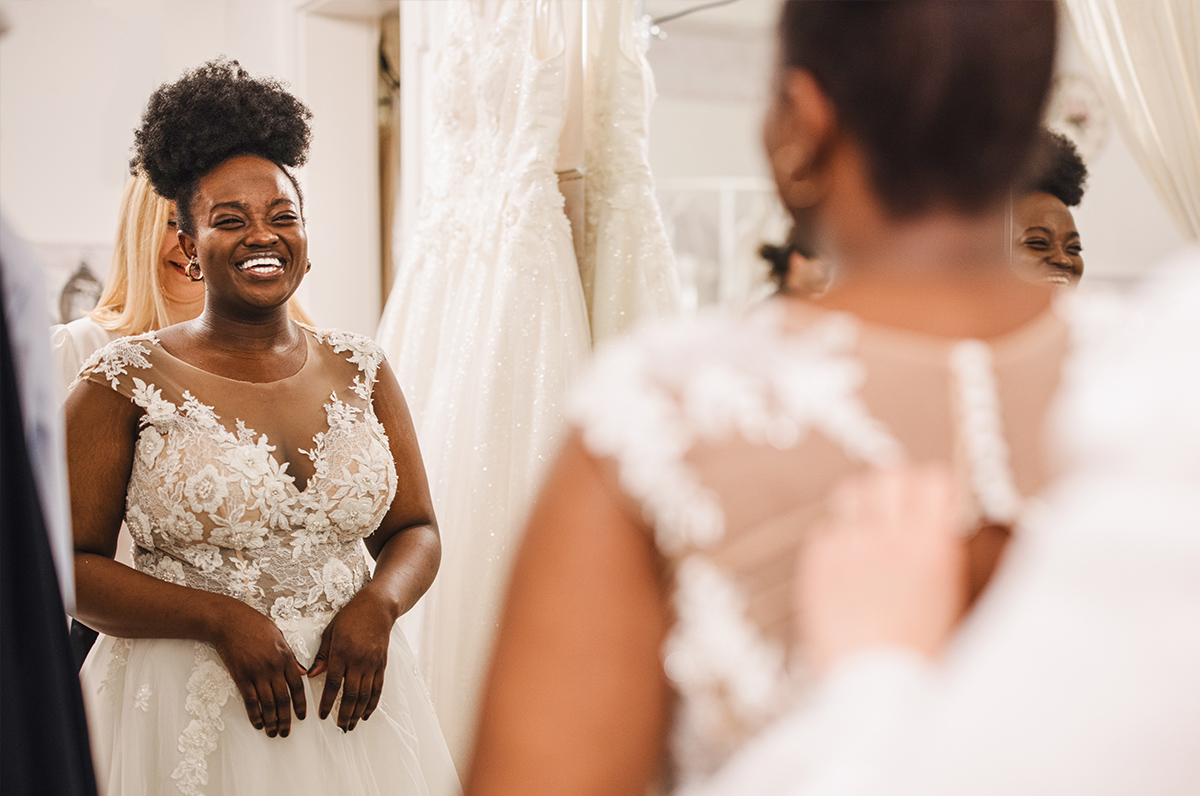
Average Wedding Dress Cost: Budget Breakdown and Tips
Advice
Today’s average wedding dress cost is between $1,500 - $2,500. Learn what impacts pricing, how to plan your budget, and smart tips for finding the perfect bridal gown.
- Expert advice/
- Fashion & beauty/
- Wedding attire/
- Average Cost of Bridesmaid Dresses: What to Expect
Find even more wedding ideas, inspo, tips, and tricks
We’ve got wedding planning advice on everything from save the dates to wedding cakes.

